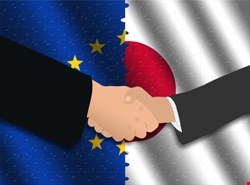
Senior European Union officials including Council president Herman Van Rompuy met their Japanese counterparts for high level talks in Brussels this week aimed at fostering greater co-operation on cyber security.
In a joint press statement released on Wednesday, Japanese prime minister Shinzo Abe, EU Council president Van Rompuy and European Commission president José Barroso said they had decided to launch an “EU-Japan Cyber Dialogue”.
This will focus on “promoting cooperation on cyberspace through exchanges of our respective extensive experience and knowledge”, the statement noted.
“Facing more severe, widespread and globalised risks surrounding cyberspace and the need to protect human rights online, protection of a safe, open and secure cyberspace is needed,” it added.
The three also made a brief mention of their satisfaction at the progress of the 2nd EU-Japan ICT Security Workshop held in December 2013 to facilitate best practice sharing between the two.
Although cyber security only gets a relatively brief mention, its inclusion in a joint statement heavily focused on military, trade and global security matters nevertheless illustrates its growing importance in geopolitical discussions.
It also highlights Japanese PM Abe’s desire to play a more central role in international discussions on cyber security.
He has already begun dialogue with several other nations including the UK, US and India and also made improvements to government and critical infrastructure cyber defences a major part of a National Security Strategy adopted in December last year.
BH Consulting CEO Brian Honan, special advisor on internet security at Europol’s European Cybercrime Centre (EC3), told Infosecurity Magazine that any improvements in co-operation between nation states should be welcomed in the fight against cybercrime.
“Too often we focus on stopping the symptoms of the cybercrime – such as botnets and DDOS attacks – but not on stopping those actually behind the attacks. Greater international cooperation between police forces will help in putting these people behind bars,” he added.
“These agreements can help in the quicker processing of international warrants and just as importantly in the sharing of intelligence data relating to online criminals and gangs.”
However, such international agreements are not a silver bullet, he warned.
“We shouldn’t overlook there are still a large number of countries which offer safe havens for cybercriminals either by having lax cybercrime laws or ineffective policing in this area,” argued Honan.“It is these countries that we need to help develop their law enforcement capabilities and develop better cooperation from.”